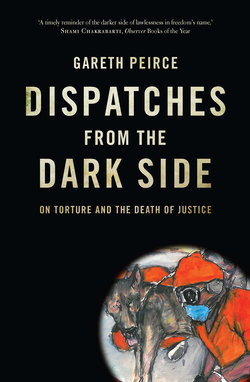Dispatches from the Dark Side

Реклама. ООО «ЛитРес», ИНН: 7719571260.
Оглавление
Gareth Peirce. Dispatches from the Dark Side
Отрывок из книги
GARETH PEIRCE is a lawyer who represents individuals who are or have been the subject of rendition and torture, held in prisons in the UK on the basis of secret evidence, or interned in secret prisons abroad under regimes that continue to practise torture. She has represented many men and women from communities wrongly deemed ‘suspect’, on cases such as those of the Guildford Four, the Birmingham Six, Judith Ward, Jean Charles de Menezes and Moazzam Begg.
On Torture and the Death of Justice
.....
The Parliamentary Committee itself, a very British affair composed of high-ranking members of the House of Commons and House of Lords who had been security cleared, was left without any coherent brief in relation to oversight and was explicitly banned from receiving information about particular operations. Its primary concerns related to finance and administration. Yet, in the face of what in any questioning society might threaten the collapse of a government, it is this committee, operating as it does on such a narrow remit within an ethos of secrecy, that has been tasked by the prime minister with reordering the ethical basis of the intelligence agencies, seemingly without any comprehension on his part of the scale of what is required. This, it seems, is intended to act as our national catharsis. Yet we are unlikely to find out any meaningful detail. It is an irony that the death of Baha Mousa, killed by the military in a war zone, was nevertheless considered in open court martial.
If we look carefully there is sufficient evidence that British foreign policy, and indeed its domestic policy, have for many years been conducted in a way that is in violation not only of our own law and of international law, but which, far worse, has led us to be complicit in torture and in the commission of internationally prohibited crimes against humanity. No more serious circumstance could come to pass. At present, instances are explained away—when they briefly, accidentally come into view—as mere blips. An individual officer, for example, may not have been properly briefed on the prohibited techniques being used by the Americans. But taken overall the excuses produced one by one begin to wear thin. The High Court, constrained as to detail by the government’s claim that secrecy is needed in the interests of national security (to enable the free flow of information with our US ally), nevertheless commented that the role of the UK in Binyam Mohamed’s torture went ‘far beyond that of a bystander’ and triggered a criminal investigation into complicity on the part of at least one officer from MI5 in Mohamed’s torture. That the excuses are produced individually, and are intended to remain separate, is part of their efficacy. Who is putting the excuses together? Whose task is it to investigate? What is the evidence that we ourselves can piece together? Whose job is it to find the evidence, in a situation where it has become too embarrassing and uncomfortable not to be seen to be looking for it?
.....